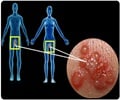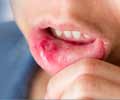A new study reports that an experimental vaccine for herpes simplex virus type 2, called GEN-003, can help reduce viral shedding.

The injectable vaccine is given several times over the course of a few weeks. The clinical study is closed to enrollment, but participants continue to be followed. GEN-003 is one of the first vaccines intended to reduce the viral shedding and frequency and severity of outbreaks and transmission of herpes simplex virus type 2, which is the most common cause of genital herpes. It is estimated to infect more than 500 million people worldwide, and one out of six people age 14 to 49. In the U.S., an estimated 50-60 million people are affected.
"Although the ultimate goal of this vaccine is reducing genital herpes outbreaks and reducing transmission of the virus to others, this is only the first step on a long path toward reaching that goal. It will take several more studies and a number of years to determine if we can reach that goal," Fife cautioned.
Source-Eurekalert













